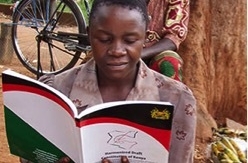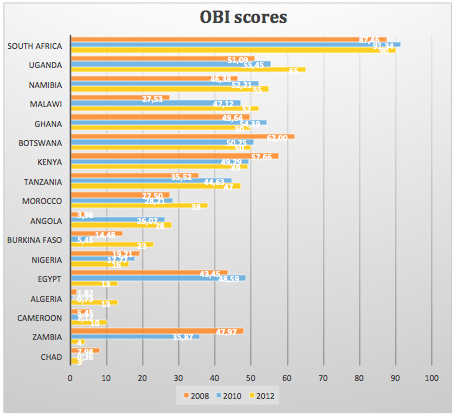
Kenya’s 2010 Constitution, and the new Public Financial Management (PFM) Act that details the main public finance related principles of the Constitution, are ambitious. There is no question that Kenya is at an important juncture when it comes to PFM. Kenya was therefore deemed to be a good candidate for a review of the country’s budget openness, as part of the CABRI/IBP project on Budget Transparency.
The team that facilitated the Kenya review comprised of senior budget officials and civil society representatives from Lesotho, Liberia and South Africa. This team was supported by the CABRI Secretariat and the IBP representative in Kenya, a PFM expert and a representative from the World Bank.
The Kenya review of budget transparency followed a similar review in the DRC (blog link). Two more reviews are envisaged for 2014. The aim of the review is to define feasible objectives and plans for implementing country-specific transparency reforms that are drawn from African experiences.
How transparent is the Kenyan budget?
The Kenyan budget was appropriated according to a programme structure for the first time in 2013 for all Ministries. In several of the previous budgets, a list of programmes were annexed to the actual budget that was presented in the traditional line-item structure. This reform is a significant change to the budget formulation and appropriation process in Kenya, and also introduces greater transparency and accountability.
However, the information provided in the programme budget is limited. This is due to highly aggregated information, as well as there being little budget narrative. The review team shared examples of how programme budgeting is done in South Africa and how the adoption of certain practices could lead to an improvement in budget transparency, such as:
- Full, detailed budget proposal could be published on the web at the same time when tabled in parliament: available as PDF, data also in excel;
- Include sub-programme and economic classification details for each programme
- Provide information for seven years: 3 past, current, 3 forward
- Provide a narrative on policies funded and outturn for previous year
- Details of wider public sector entity budgets and off-budget expenditure (public agencies and corporations)
It will also be important for Kenya in the coming years to distinguish between the Executive Budget Proposal (Budget Statement) and the Enacted Budget post parliament’s proposals. Efforts to increase transparency on donor projects will also be necessary.
IFMS and the downstream challenge
An opportunity for Kenya to improve budget transparency will be the production of more reliable and comprehensive annual financial statements. The complete roll-out of the IFMS provides the tool for more frequent and real time information releases. When the use of IFMS is strengthened and all payments are on-system, the IFMS will play an important role in improving accountability in the budget process (through, for example effective audit trails).
There is a need to accelerate accounting and reporting institutions and capacity to improve reliability and consistency of information. For example, the Auditor General may need to improve capacity to achieve legislative benchmarks on timeliness. There is an opportunity to immediately include information on previous years in the same format as the budget proposal. Mid-year and year-end reports are also within easy reach, for example the tabling of the supplementary budget is an opportunity for the presentation of a mid-year update.
Counties and participation mechanisms
Counties play a strong role in Kenya’s new PFM structure. The 47 counties hold important responsibilities within the new decentralised constitutional and fiscal arrangements. From the visit by the review team to Nyeri county, it was found that the county publicises local budgets in novel ways, such as: on notice boards placed on the roofs of motor vehicles; church announcements; and publication in major newspapers.
This is an example of how participation is not only a National Treasury obligation – it is a feature of the new PFM Act at all levels of government and other state and non-state actors. Civil society has an important role to play in this regard, especially in their role as intermediaries that provide budget training and awareness to citizens.

Focus on results based budgeting
From PFM Act to implementation
The Kenyan Government is currently developing regulations that will give effect to the full implementation of the PFM Act. The success of these reforms will depend on how these regulations will be defined and implemented. The concept of participation will need to be developed and a framework put in place in order for public participation to be regular, predictable and systematic, and importantly, for reports to clearly state how the public’s recommendations have been accommodated. The same can be said of transparency – what is “publish and publicise” as required by law? The term “publish and publicise” is generally referred to in Kenya as meaning that citizens are able to access a printed copy of documents through the government’s printer in Nairobi. However, this is at a cost and not always very practical for hefty volumes. Responsibilities for making documents available will also need to be defined within the National Treasury.
A collaborative effort for improvement
There is a strong legal foundation for greater fiscal transparency and participation reforms in Kenya. More useful information (e.g. move to programme budgeting) and better opportunities for participation have already been made started (e.g. sector working groups, public hearings). But, as mentioned in many of the interviews conducted by the review team, Kenya is learning – it will first start by crawling before it can walk and run.
The review is a collaborative country-led effort and a starting point for a continuous process of engagement with the National Treasury and the various stakeholders involved. In conclusion, it is the view of CABRI that there is sufficient legal basis, amble enthusiasm and commitment, and capacity for the Kenyan Government to steadily improve Budget Transparency and Participation. CABRI and the IBP are committed to supporting the authorities in Kenya in this regard through peer-exchange and learning initiatives.